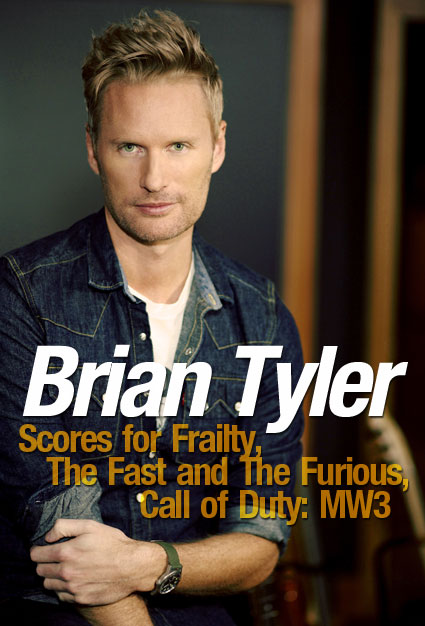 Brian Tyler has been reading Music Connection ever since he started out in the business, back in the mid-‘90s, in the days when he was trying to decide whether to be a musician or a composer (http://briantyler.com).
Brian Tyler has been reading Music Connection ever since he started out in the business, back in the mid-‘90s, in the days when he was trying to decide whether to be a musician or a composer (http://briantyler.com).
His education fit him well, whether earned through MC, UCLA where he received his Bachelor’s Degree or Harvard where he earned his Master’s Degree. Recently nominated for “Film Composer of the Year” by the International Film Music Critics Association, Tyler has composed and conducted for over 50 films. His work has included scores for Eagle Eye for producer Steven Spielberg, the box office hit The Fast and The Furious, The Expendables and Rambo, directed by Sylvester Stallone, as well as the best-selling video game of all time Call of Duty: Modern Warfare 3. He also wrote the music for Steven Spielberg’s new 20th-Century Fox series Terra Nova. More recent works include Thor: The Dark World and Iron Man 3.
Hits always garner praise for a composer. This aspect can be either confusing or amusing, but Tyler’s approach is straightforward. “It’s hard to tell when a movie is going to be a hit, so you give it your all,” he says of the process. “It’s always interesting to see what the critics and audiences say. Sometimes the movie score lives on and inspires people to see the film and sometimes vice versa.”
Tyler’s approach has served him well ever since his first major film, the 2001 psychological thriller Frailty, starring Bill Paxton—who also made his directorial debut with the film. Nobody knew anymore what to expect from this intimate horror piece than from any other film in production. For his part, Tyler says he “had no idea that Frailty would be the key to my getting larger studio films. You can really draw a line between them.” A box office and critical success, Frailty won Tyler a World Soundtrack Award in 2002 as well as The World Soundtrack Award as Best New Film Composer of the Year.
One result of his accolades and attitude has led to Tyler being offered projects that are particularly heavy with score. His approach to each is the same. “You try to make the film as good as it can be but also concentrate on the musicality,” he says. “You have to be unafraid of making a mistake because otherwise you don’t say anything and end up with musical wallpaper.”
No composer wants to blend into the background of a film, yet the composer’s job is, at its core, to assist the director to realize his or her vision. Any aspect of filmmaking requires a tricky balance between art and commerce. “It’s the director’s vision but the composer is trying to help the film overall,” Tyler says. “They may have expectations of the music but you throw them something different. I will always try to present the music as something that helps the film. In the end, it’s great when everyone agrees on something that seemed like a surprise.”
Tyler has learned through experience how to present his art, but also how to work efficiently. The key is education. “You have to both love film music and learn film music,” he advises. “When you’re hired for a film, it’s like you’re joining a band. The director may not speak music so the composer has to learn how to speak film.”
The best way to learn the language of film, to Tyler, is to immerse oneself in the world of film. “About half of the composers I know started as assistants or interns to other composers,” he says. “Companies tend to promote from within.”
Contact Jeff Sanderson, [email protected]













